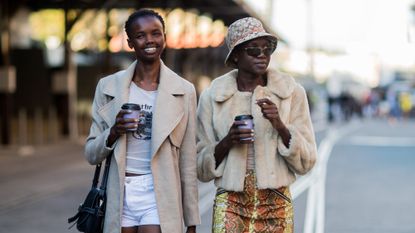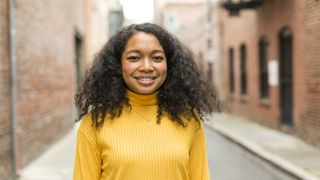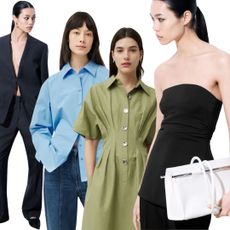Four ways to create a more inclusive workplace
It's time to create a working culture where everyone feels valued and heard, says Abadesi Osunsade, the Founder and CEO of Hustle Crew, a diversity consultancy. Here she shares her top tips for making our work teams more inclusive.


It's time to create a working culture where everyone feels valued and heard, says Abadesi Osunsade, the Founder and CEO of Hustle Crew, a diversity consultancy. Here she shares her top tips for making our work teams more inclusive.
If diversity means celebrating our differences we must respect and value a balanced range of perspectives and ensure we have a range of different voices in our team that are equally supported and heard.
Corporate culture, like many other parts of our patriarchal societies, have been designed with the lived experience of straight, white men in mind. But what about the rest of us? What efforts can we each make to turn our offices into environments where all professionals, regardless of their background, can flourish?

Here are four ways to make work more inclusive:
1. Take stock of the identities that dominate your office
Research shows our lived experiences shape everything from how we think about the world to our motivations and cultural behaviours. Is there a particular type of person that's well represented across the leadership team and beyond? If so, how could that dominant identity group impact company culture and views? What risk is there that certain perspectives represented amongst your customer or client base are being missed due to your team make up? Spark up conversations with your team about whose voices matter to your work but are not represented in the team. Think of ways to expand your community and outreach to include these voices.
2. Recognise where you have privilege and therefore blind spots
Professor Michael Kimmel famously said, “Privilege is invisible to those who have it.” That means that privilege i.e. unearned advantages we gain through our identity, which we have no choice over, can be difficult to discern unless we actively consider the experiences of other people in our society who don’t share the same opportunities, choices and other advantages we have. For example, as a cis gender heterosexual woman I have never had to experience the anxiety that comes with using a restroom in public buildings, or fear violence when walking hand in hand with my partner on holiday in exotic countries.
3. Get comfortable with being uncomfortable
Look at the tragic events we’ve witnessed these past few years from the murder of George Floyd to the fatal shooting of Chris Kapa, both at the hands of the police. And let's not forget the death of Belly Mujinga, who passed away from coronavirus which she contracted after an infected passenger spat at her at the station where she was working. It is undeniable that our identify has a huge impact on how we navigate the world, and it has a huge impact on how others treat us. This is an uncomfortable truth that we must engage with regularly so we can take action to make the world more fair and equitable. Be willing to challenge racism, and other forms of discrimination wherever you hear them or see them.
4. Focus on your vision of the future
Fighting for equality and fair treatment of all identities takes guts. It's not easy. The more you become aware of privilege and discrimination, the more you will see it play out in everything from the media, think about toxic headlines in the newspapers, to banter at the office, think of the types of jokes you’ve heard that made you stop and think. What has helped me do the work I do, challenging bias wherever I see it, is focusing on the future. In the future I want to see more women especially Black women and other women of colour, leading teams and companies and really - doing whatever they want. Without the obstacles they face today. I wish this for all marginalised identities underrepresented at work everywhere.
Marie Claire Newsletter
Celebrity news, beauty, fashion advice, and fascinating features, delivered straight to your inbox!
Abadesi Osunsade is the Founder and CEO of Hustle Crew, a careers community for the underrepresented in tech and a diversity and inclusion consultancy on a mission to make teams more inclusive. Hustle Crew Membership is for anyone who wants to be an inclusion ambassador in their community, with weekly resources and monthly workshops to teach you how to drive change from £12/month.
Niamh McCollum is Features Assistant at Marie Claire UK, and specialises in entertainment, female empowerment, mental health, social development and careers. Tackling both news and features, she's covered everything from the rise of feminist audio porn platforms to the latest campaigns protecting human rights.
Niamh has also contributed to our Women Who Win series by interviewing ridiculously inspiring females, including forensic scientist Ruth Morgan, Labour MP Stella Creasy and ITV’s former Home Affairs Editor Jennifer Nadel.
Niamh studied Law in Trinity College Dublin. It was after enrolling in a Law & Literature class on her year abroad in Toronto that her love of writing was reignited. In no particular order, her big likes are Caleb Followill, hoops, red wine, sea swimming, shakshuka and long train journeys.
- Jenny ProudfootFeatures Editor
-
 16 pieces of spring workwear from COS, Aligne and Jigsaw that are genuinely worth the investment
16 pieces of spring workwear from COS, Aligne and Jigsaw that are genuinely worth the investmentNail your spring workwear wardrobe with minimal effort
By Valeza Bakolli
-
 Trust me, tinted lip balms are the low maintenance way of adding a wash of colour without the stress - here are 7 of the best
Trust me, tinted lip balms are the low maintenance way of adding a wash of colour without the stress - here are 7 of the bestFrom affordable to luxe, these are the ones I love
By Tori Crowther
-
 Here's exactly how to get your feet sandal-ready in 6 simple steps, according to a nail tech
Here's exactly how to get your feet sandal-ready in 6 simple steps, according to a nail techThese are the products I rely on
By Tori Crowther